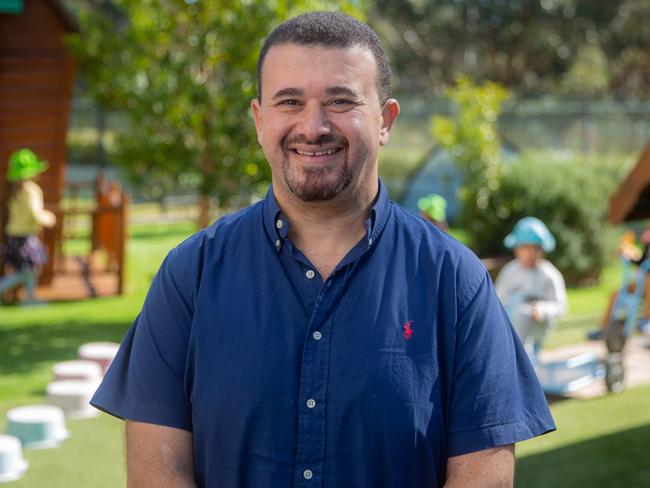Pay bonuses for childcare workers
Childcare workers are commanding pay rises, sign-on bonuses, petrol discounts and paid ‘wellbeing days’ off work as daycare centres fight to fill 7000 vacancies.
Childcare workers are commanding pay rises, sign-on bonuses, petrol discounts and paid “wellbeing days’’ off work as desperate daycare centres fight to fill a record 7000 vacancies.
Vacancies have more than doubled since the start of the pandemic, when centres were short-staffed by 3000 workers, National Skills Commission data reveals.
Goodstart Early Learning, the nation’s biggest childcare operator, is paying 5 per cent above award wages for diploma and certificate-qualified staff, and is matching school wages for early childhood teachers.
The group is even paying staff a $500 headhunter bonus if they refer a potential employee who passes probation. Staff also get an 8c-a-litre discount on fuel, half-price childcare fees and two “personal wellbeing days’’ each year.
The surge in staffing expenses, along with soaring rent and electricity costs, is fuelling fees charged to parents and will put pressure on the federal budget, given that taxpayer subsidies for childcare are paid as a percentage of fees.

Goodstart has already hiked fees twice this year – 4.9 per cent in March and another 3.5 per cent lin August to cover a 5.8 per cent pay rise for its staff in July.
“We’d like to see the federal government fund a wage supplement to reduce the wage gap between early childhood and government schools,’’ Goodstart head of advocacy John Cherry said on Sunday.
Australian Childcare Alliance president Paul Mondo said fees would rise further unless the federal government directly subsidised staff wages.
“These are unprecedented times in terms of demand for staff and improved wages and conditions are part of that,” he said.
“We’re asking for support so families are not impacted.’’
Genius Childcare will temporarily close one of its three childcare centres in the inner-Sydney suburb of Pyrmont next week, because of staff shortages.
The operator’s general manager of education, Sel Omerovic, said the centre was already paying up to 10 per cent more than the award wage, with an extra two weeks’ holidays and sign-on bonuses ranging from $500 to $2000.
The United Workers Union, which organised a walkout of thousands of childcare workers in August, is pushing for a 30 per cent wage rise, directly subsidised by the government.
The award wage for daycare workers is about $25 an hour for workers with a Certificate III qualification, $27 an hour for those with a diploma, and $39 an hour for a centre director.
UWU early education director Helen Gibbons said staff felt “underpaid and undervalued’’ and ought to be paid as much as school teachers, who were also demanding higher pay.
“Centres are closing rooms and turning away children because they can’t find enough staff,’’ she said. “In the inner city, where rents are really high, it’s hard to find educators who can afford to live in the area, and commuting is really expensive.’’

Ms Gibbons said the federal government must directly fund wage increases, “otherwise it goes into profits’’ for centres.
“Every time the government raises the subsidy, not one cent goes back to educators,’’ she said.
Carl Elassal, the founder of Thrive Early Learning, said he was paying up to $5-an-hour more than the award wage to keep staff in his 12 centres.
“We operate a bonus scheme so if they stay with us for five years, we’ll pay them $5000, and if they stay for seven years it’s a $7000 bonus,’’ he said.
“For every year they stay, we give them an extra day of holiday, so if they stay five years they get an extra week off. We give them health cover and pay their gym membership.’’
Mr Elassal said his wage bill had soared 15 per cent since the start of the pandemic, while rents had risen 6 per cent this year, resulting in a 10 per cent fee increase to $160 a day.
He called on governments to allow early childcare teachers to teach more than 10 preschoolers at a time, comparing their work to year 1 school teachers with 30 children.
Even casual staff are starting to call the shots about where and when they work, using a new Uber-style app by Z Recruitment that lets daycare centres fill staff shifts at short notice.
Z Recruitment managing director Jessica Hennessy said staff employed through the app were paid 10 per cent more than award rates.
“If they need flexibility to study or drop off and pick up children, they can select their days or hours they want to work, and select a kilometre radius,’’ she said.
In March, the former Coalition government introduced higher subsidies for families with two or more children in childcare, saving them up to $2200 a year.
The Albanese government has pledged to pay 90 per cent of families’ childcare costs, for households earning up to $530,000 a year.
Federal Minister for Early Childhood Education Anne Aly said increasing the childcare workforce was critical to the government’s plan for cheaper daycare.
“We’re increasing the number of university spots, bringing forward fee-free TAFE places, changing the Fair Work Act to allow multi-employer bargaining and taking action to close the gender pay gap – all of which will benefit the early childhood education sector.”




To join the conversation, please log in. Don't have an account? Register
Join the conversation, you are commenting as Logout